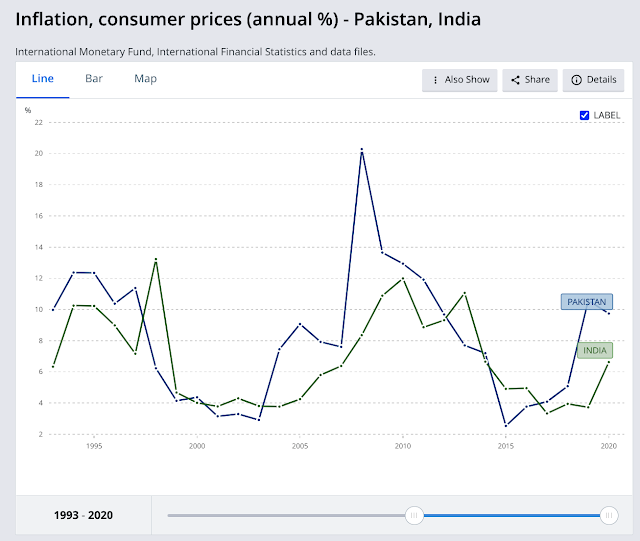PakAlumni Worldwide: The Global Social Network
Prime Minister Imran Khan has effectively led Pakistan through multiple crises in the last 4 years. Khan inherited dangerously low forex reserves in 2018 which are now at $23 billion, near the highest level in the nation's history. The COVID pandemic that hampered Pakistan's recovery has been handled well with the fully vaccinated rate for the eligible population at more than 75%. Not only has Khan deftly navigated his nation through these crises but his government has also revived the country's economy and grown exports by 26%. Domestic savings rate recovered to nearly 17% after plunging to a low of 12% in 2018. The year 2021 was a banner year for Pakistan's technology startups that raised over $350 million in funding, more than the amount raised in the previous 5 years. Manufacturing and construction industries are enjoying a boom last seen during the Musharraf years in 2000-2007.
 |
| Historic Inflation Rates in India & Pakistan. Source: World Bank |
 |
| Pakistan Exports in First 8 Months (July 21-Feb 22) in FY 22. Source: Razzak Dawood |
 |
| Pakistan Employment By Sectors. Source: Pakistan Bureau of Statistics |
For the first time in recorded history, the labor force participation rate in Pakistan is now higher than in India, according to the ILO/World Bank estimates.
 |
| Labor Participation Rates in India and Pakistan. Source: World Bank/ILO |
 |
| Unemployment Rate in India and Pakistan. Source: ILO/World Bank |
 |
| Pakistan Savings Rate. Source: Global Economy |
 |
| QIM Index 2019-22. Source: APP |
 |
| Pakistan Large Scale Manufacturing Index. Source: Mettis Global |
 |
| Cement shipments in Pakistan. Source: All Pakistan Cement Manufacturers Association |
 |
| Pakistan Startup Investments. Source: Aljazeera |



Riaz Haq
Reko Diq pays $28 million to Balochistan in taxes
https://dailytimes.com.pk/1338235/reko-diq-pays-28-million-to-baloc...
Communications Manager Samia Ali Shah stated that by June 2025, RDMC paid $17.5 million in royalties, around $3.8 million in taxes collected from employees and partners, and $7.2 million toward social development programs. These payments highlight the project's ongoing commitment to the province's growth.
She clarified that the Balochistan government holds a 25% stake in the project. However, it has not made any direct investment so far. The project operates under a 50-50 partnership between the federal government of Pakistan and RDMC.
The briefing also shed light on the company's efforts to develop the local workforce. RDMC has taken steps to train youth from the region to help them gain technical skills and career opportunities in the mining sector.
Several young trainees, recently returned from Argentina after completing 18 months of technical training, were present at the event. According to Samia, 14% of these trainees were women, marking a notable push for gender inclusion in the mining workforce.
She added that this project holds long-term benefits for the region and is designed to uplift communities, build skilled human resources, and ensure sustainable economic development in Balochistan.
Jul 19
Riaz Haq
‘Generational benefits’ from Reko Diq mines will uplift conflict-hit Balochistan — Barrick CEO
https://www.arabnews.com/node/2608119/pakistan
“Reko Diq is not just a mining project; it is a multi-generational opportunity that promises sustained economic and social development for local communities for decades to come,” Barrick CEO Mark Bristow said in a statement on Monday released after he visited Humai, the closest village to the project site in District Chagai.
Bristow met local elders and development committee members, reaffirming the company’s goal to invest in job creation, skills training, education, and health care for Baloch communities.
“We are creating job opportunities not only through RDMC but also through our large network of partner and supplier companies that are coming onboard to support this major development,” Bristow said. “Currently, 75 percent of our workforce is from Balochistan — the majority from District Chagai — and we aim to continue strengthening this local representation.”
Bristow also highlighted recent investments in health care, including a new Mother and Child Health Center in Humai that offers maternal care services — the first such facility of its kind in the area.
“No meaningful development of this world-class mineral resource can happen without the active involvement and support of the people who live here,” he said.
Humai village chief Liaqat Malik and Par-e-Koh Community Development Committee Chairman Taj Muhammad thanked Bristow and RDMC for their engagement and development work, pledging continued community support for the project, according to the Barrick statement.
The Reko Diq project is expected to begin production by 2028 and generate thousands of jobs while significantly boosting Pakistan’s export revenues. The Pakistani government has said it will ensure environmental protections and fair distribution of project benefits, though watchdog groups continue to call for greater transparency and community participation in oversight.
Jul 19
Riaz Haq
Uzair Younus عُزیر یُونس
@UzairYounus
🇵🇰's Reko Diq mine now has:
🇨🇦 operator
🇫🇮 power provider
🇯🇵 equipment made by 🇺🇸 workers
🇺🇸-led institutions like the IFC and WB funding
As it scales, the project can truly change the country's FDI environment.
https://www.komatsu.jp/en/newsroom/2025/20250625
https://x.com/UzairYounus/status/1947304448394407997
Jul 21